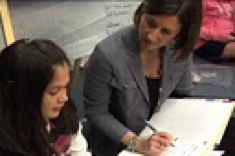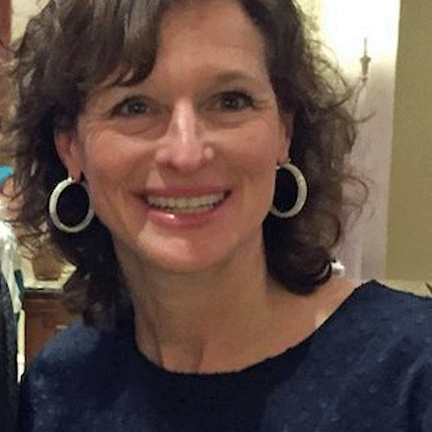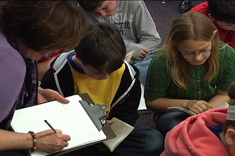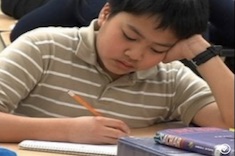As we work with teachers on conferring during reading workshops, we often rely on Lucy Calkin’s instructional model for one-on-one conferences: research, decide and teach. Recently in our coaching, we have been talking with teachers about using some of our conferences just to “research.” This has given us an opportunity to observe what strategies children apply when reading independently, and to listen to what children have to say about their own reading process.
The more we try this with teachers, the more we find assessment conferences are an essential part of reader’s workshop. So many readers can discuss reading strategies but when we watch them closely, we notice that they do not actually use the reading strategies independently. We know from the gradual release of responsibility research that it is essential to watch readers closely to see that they are actually applying what they have learned when working independently. Assessment conferences are giving us the time to do just that.
During these assessment conferences, we watch learners to notice what strategies they know how to use, and we identify possible strategies students need to learn. These assessment conferences also give us a chance to listen as students talk about what they are interested in reading, and their ideas for possible next learning steps. Of course, these conferences don’t take the place of full assessment sessions, or notes from reading with students over time. However, we found that what the children showed or told us during these informal and fast-paced conferences gave us important ideas about what questions to explore more fully, as well as some insights into what to teach during small group and future one-on-one conferences.
Setting up for Assessment Conferences
Before working with any of the students, we looked through the classroom teacher’s conference notes. After a brief discussion, we selected a few important concepts to assess. Here are a few examples of assessment conferences.
Book Choice – Conferring with John
We decided to ask the following questions about book selection to see what information we could glean from John:
Tell me what is in your independent reading book bag. Which books are your favorites?
Can you tell me why you like this book?
Why isn’t this book your favorite?
As we huddled close to John, we found that these simple questions gave us so much information. It only took us a few minutes to hear John’s thoughts and opinions. John pulled out his books and just started talking. “I really like to read books about famous people like Albert Einstein and George Washington.”
“Why do you like these books?” we asked.
“I like hearing about what happened to other people”, John replied.
“What do you know about reading biographies?”
“I just know these books are about people. That’s all,” John replied.
Now we knew that John could benefit from learning more about the text structure and features of a biography.
In our conference notes we jotted: John wants to read more biographies. Teach him about chronological order and the text features found in a biography.
Book Choice – Conferring with Samantha
We asked Samantha the same questions we asked John. She began by pulling a Judy Moody book from her book bag.
“I don’t want to read this one because I don’t know how to read chapter books yet. They are too long for me.”
Her response told us that she might benefit from reading a chapter book in a small group, so that she can learn strategies for building stamina and remembering the plot from one reading session to the next.
We wrote in our conference notes: Samantha needs experience reading chapter books. Possible teaching points – learning to preview a book, remembering what she read during a prior session, and setting goals to build stamina for longer books.
Looking at Decoding/Vocabulary – Conferring with Joel
We were concerned that Joel was reading “right past” unfamiliar words. We developed a few questions that would help us figure out what he did when he came across an unfamiliar word. To begin, we quickly looked through Joel’s independent reading books and found a few difficult words. We wrote these words on post-it notes.
When we conferred with Joel, we stopped at the word humanitarian in the text. “Can you show us what you would do to read a long word like this word?”
Joel read, “hum – an – tar.”
“Have you ever heard that word? What do you do when you find a word like this?” Joel exclaimed, ” Oh, I just skip right over the really long ones.”
We briefly explained the meaning of the word humanitarian and moved right along. We showed Joel a few more multisyllabic words from the text (i.e., concentrating, occasionally). It became clear that if he knew the word by sight he could read the word automatically, but when the word was unknown he needed some additional instruction on how to make sense of unfamiliar words. Joel is reading above grade level, so many of the words he encounters on a day-to-day basis are sight words for him.
We decided to assess his phonetic knowledge a bit more thoroughly at a later time to see what particular skills might help him with decoding multisyllabic words. We were also concerned about his strategies for making sense of unknown words, so we probed further.
Vocabulary in Context – Continuing to Confer with Joel
We asked Joel what he does to figure out the meaning of some of these unfamiliar words. We wanted to know whether he was able to infer the meaning of an unknown word, even though he might mispronounce it. We also wondered what strategies he actually used when faced with an unfamiliar vocabulary word.
We found a sentence in the text and this time the word was “minor”. We asked him to read the paragraph that included minor. “Can you tell me what this word means? How do you know?”
Joel said, “That word is min-nor. I’m not sure what that one means.”
“What do you do when you say a word but you don’t know what it means?”
Joel just shrugged his shoulders.
We wrote in our conference notes – Joel might need to work on syllable types – assess his knowledge of phonetic skills. We also wrote, Joel needs strategies for figuring out the meaning of unknown words in context. the first strategy to teach might be “stop and reread when your reading doesn’t make sense.”
Comprehension – Conferring with Giselle
The class had recently studied retelling, and we wondered whether the students could apply retelling strategies when reading independently. We decided on a few questions to ask that would give us a bit of information about these students’ ability to understand the text. We began by conversing with Giselle.
“Can you show me what book you are reading right now and where you are in the book?” Giselle grabbed Frog and Toad by Arnold Lobel.
“I am wondering if we can try something today? I want to be able to talk with you about what is happening in the story and hear your thinking. Let’s both read these next two pages silently, and then let’s talk about what is happening.”
Giselle and the teacher read the pages silently and then the teacher asked, ” Let’s talk about what is going on in these pages. Right here (pointing to the text) . . . Can you tell me what else happened? Next she asked, “What do you think will happen in the rest of this chapter? What makes you think that?”
Giselle was able to say what was happening on these two pages, but had a harder time thinking about what might happen next.
In our conference notes we wrote: Possible teaching point, — making and supporting predictions. Give DRA2 to assess fully.
After working individually with these four children, we looked at the clock and were amazed that four conferences had only taken 20 minutes. As we reflected on our learning from this session, we talked about what we as teachers had learned:
Lesson 1: Using our prior conferring notes really saved time. It helped us to pinpoint one or two focus areas to assess.
Lesson 2: Taking the time to let kids talk about their book choices was invaluable. The children had a lot to teach us about what they needed to learn when they explained their book preferences.
Lesson 3: Listening to students first before jumping into teaching is so important. Although we all know this, we found these conferences were a good reminder.
As we continue to try out these assessment conferences with children and debrief with teachers, we’ll keep Calkins’ advice in mind, refining how we “research, decide, and teach” as the students guide us with their knowledge and needs.










